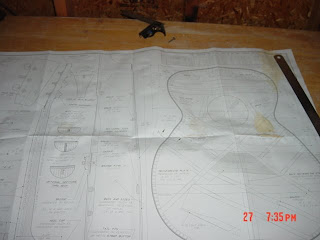In the summer between 8th and 9th grade, I went to Camp Ramblewood Basketball Camp. The year before I had gone to Lefty Driesell's camp at the University of Maryland. Dad said he'd pay for half of the camp fee if I came up with the other half, so I mowed lawns all summer. Turns out that a friend and teammate who lived around the corner from me, Mike Beck, was planning to go also, so we made sure we roomed together. We got to sleep in one of the dorms, got to eat at the dorm cafeterias, and, best of all, got to play basketball at Cole Field House and be coached by Lefty Driesell.
I tell you that to provide context for the next statement: Camp Ramblewood was a dump. It really was a camp out in the woods. We slept in cabins with 12 guys. We ate camp food in a dining hall. The inside basketball court was old, dingy, and dark. The outside courts were actually tennis courts with goals around the perimeter. There were no famous basketball players or professional players there, and not a single pretty coed. Morgan Wooten, the legendary high school coach at DeMatha, came up for an afternoon session with a couple of his players, but they left immediately.
Coach Wooten didn't want to stay at Camp Ramblewood.
The only reason I went was because our jr. high coach was working at the camp and 3/4 of the team was going and I didn't want to be left out. Even Mike was leaving Lefty.
We were bused to the camp, which is in Harford County near Havre de Grace. All the campers and some of the counselors from the D.C. area met at a school parking lot to board the buses. I was talking to my best friend Maurice while waiting to board when we noticed the tallest person we had ever seen in our lives standing near one of the buses. We were trying to guess his height but had no idea, so we came up with a plan. I ambled over to him, just minding my own business, until I was standing next to him. Didn't look at him, didn't try to talk to him. Just stood there for a minute, then walked over to Maurice.
"Larry, he was about a foot taller than you!" I was about six feet at the time, so that meant we were getting our first look at a seven-foot person. Back then, about the only seven-footers anyone heard of were Kareem Abdul Jabbar and Wilt Chamberlain.
His name was Marvin Webster, he was from Baltimore and was entering his junior year at Morgan State University, a Division II school. And he was 7' 1''.
At Ramblewood we were put on teams and assigned coaches, and Marvin was the coach of my team. He was a lot of fun, and we really enjoyed playing for him. Our team wasn't very good; we were probably a .500 team, I don't really remember. But I remember one time Marvin was trying to motivate us for an upcoming game, so we made him promise us that he would dunk five times for us if we won. (Back then dunking wasn't allowed in college, so it was actually a rare treat to watch someone dunk. Hard to believe now that dunking is commonplace.)
We won, and we had to sneak to an out-of-the-way court for Marvin to fulfill his promise, because dunking wasn't allowed at Ramblewood. This was before breakaway rims, and Ramblewood couldn't afford for these college guys to be bending their rims.
Marvin dunked one-handed, two-handed. We told him to do it behind his head, and he did. With each dunk we all laughed and slapped skin. He could have gotten in trouble, but a promise is a promise.
Playing at a small school, nobody had heard much about Marvin Webster, but the next year he averaged 8 blocks a game (the NCAA Division I leader last year averaged 5.3) and led Morgan State to the NCAA Division II championship. I remember reading an article in Sports Illustrated about "The Human Eraser," and there was a picture of my coach, swatting some poor fool's shot away.
He was the 3rd pick in the 1975 NBA draft, but signed with the ABA Denver Nuggets. The next year the ABA merged with the NBA and the Nuggets were one of the teams that survived. He played with them for nine years before being traded to Seattle. That was his best pro year as he led the Supersonics to the 1978 NBA finals against the Bullets. I went to one of those games and had to root against my old coach's team--but not against my old coach. The Bullets won the championship in seven games, and the next year Marvin signed a then unprecedented $3 million contract with the New York Knicks which landed him on the cover of Sports Illustrated. Unfortunately, knee problems and a serious case of hepatitis which caused him to miss two full seasons limited his play, and he never was able to reach the heights with the Knicks that he had with the Sonics or even the Nuggets. He finished his career with the Bucks in 1986-87.
Marvin died the other night in Tulsa. He was found in a hotel bathtub. Fortunately, this isn't the story of some former star who couldn't deal with life outside of sports and died penniless of a drug overdose in some back alley dive.
It seems that the hepatitis and coronary heart disease just caught up with him.
The papers all say that he was a gentle, jolly giant.
Yes, he was. That's how I will always remember him.















